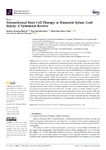Mostrar o rexistro simple do ítem
Mesenchymal stem cell therapy in traumatic spinal cord injury: a systematic review
| dc.contributor.author | Montoto-Meijide, Rodrigo | |
| dc.contributor.author | Meijide-Faílde, Rosa | |
| dc.contributor.author | Díaz-Prado, Silvia | |
| dc.contributor.author | Montoto Marqués, Antonio | |
| dc.date.accessioned | 2023-11-06T10:44:04Z | |
| dc.date.available | 2023-11-06T10:44:04Z | |
| dc.date.issued | 2023-07-20 | |
| dc.identifier.citation | Montoto-Meijide R, Meijide-Faílde R, Díaz-Prado SM, Montoto-Marqués A. Mesenchymal stem cell therapy in traumatic spinal cord injury: a systematic review. Int J Mol Sci. 2023 Jul 20;24(14):11719. | es_ES |
| dc.identifier.issn | 1422-0067 | |
| dc.identifier.uri | http://hdl.handle.net/2183/34045 | |
| dc.description | Review | es_ES |
| dc.description.abstract | [Abstract] Recovery from a traumatic spinal cord injury (TSCI) is challenging due to the limited regenerative capacity of the central nervous system to restore cells, myelin, and neural connections. Cell therapy, particularly with mesenchymal stem cells (MSCs), holds significant promise for TSCI treatment. This systematic review aims to analyze the efficacy, safety, and therapeutic potential of MSC-based cell therapies in TSCI. A comprehensive search of PUBMED and COCHRANE databases until February 2023 was conducted, combining terms such as "spinal cord injury," "stem cells," "stem cell therapy," "mesenchymal stem cells," and "traumatic spinal cord injury". Among the 53 studies initially identified, 22 (21 clinical trials and 1 case series) were included. Findings from these studies consistently demonstrate improvements in AIS (ASIA Impairment Scale) grades, sensory scores, and, to a lesser extent, motor scores. Meta-analyses further support these positive outcomes. MSC-based therapies have shown short- and medium-term safety, as indicated by the absence of significant adverse events within the studied timeframe. However, caution is required when drawing generalized recommendations due to the limited scientific evidence available. Further research is needed to elucidate the long-term safety and clinical implications of these advancements. Although significant progress has been made, particularly with MSC-based therapies, additional studies exploring other potential future therapies such as gene therapies, neurostimulation techniques, and tissue engineering approaches are essential for a comprehensive understanding of the evolving TSCI treatment landscape. | es_ES |
| dc.description.sponsorship | This study has been funded by Instituto de Salud Carlos III (ISCIII) through the project “PI20/00933” and co-funded by the European Union. | es_ES |
| dc.description.sponsorship | info:eu-repo/grantAgreement/ISCIII/Programa Estatal de Generación de Conocimiento y Fortalecimiento del Sistema Español de I+D+I/PI20%2F00933/ES/VESICULAS EXTRACELULARES PEQUEÑAS (SEVS): UNA NUEVA HERRAMIENTA TERAPEUTICA PARA EL TRATAMIENTO DE LA ARTROSIS | |
| dc.language.iso | eng | es_ES |
| dc.publisher | MDPI | es_ES |
| dc.relation.uri | https://doi.org/10.3390/ijms241411719 | es_ES |
| dc.rights | Creative Commons Attribution 4.0 International License (CC-BY 4.0) | es_ES |
| dc.rights.uri | http://creativecommons.org/licenses/by/4.0/ | * |
| dc.subject | Cell therapy | es_ES |
| dc.subject | Mesenchymal stem cells | es_ES |
| dc.subject | Traumatic spinal cord injury | es_ES |
| dc.title | Mesenchymal stem cell therapy in traumatic spinal cord injury: a systematic review | es_ES |
| dc.type | info:eu-repo/semantics/article | es_ES |
| dc.rights.access | info:eu-repo/semantics/openAccess | es_ES |
| UDC.journalTitle | International Journal of Molecular Sciences | es_ES |
| UDC.volume | 24 | es_ES |
| UDC.issue | 14 | es_ES |
| UDC.startPage | 11719 | es_ES |
Ficheiros no ítem
Este ítem aparece na(s) seguinte(s) colección(s)
-
GI-TCMR - Artigos [129]






